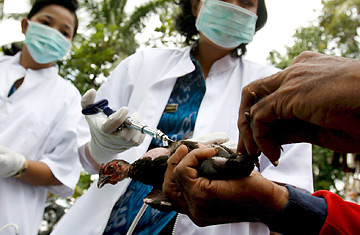
An Indonesian agricultural official vaccinates chickens in Badung, Bali, Indonesia .
The island of Bali has always been a separate part of Indonesia. A Hindu province inside the biggest Muslim country in the world, a jet-setting resort inside a poor, rural nation — and a zone free of human cases of avian influenza in the nation that has recorded the most bird flu infections in the world. But Bali is bird flu free no longer. Today the World Health Organization (WHO) confirmed the death of a young Balinese woman from H5N1 avian flu, the second case on the island in less than a month. Although Indonesian and WHO officials were quick to note that there was nothing clinically unusual about the Bali deaths — both victims apparently contracted the virus from infected poultry — the presence of human bird flu cases on a small island that hosts well over a million foreign tourists a year only adds to fears that H5N1 could eventually trigger a deadly flu pandemic that could spread around the world.
It's also a reminder that Indonesia — a vast nation of 18,000 islands and 235 million people — is quietly losing its battle against bird flu. Three years after the disease was first detected among the nation's poultry, the virus has spread to virtually every province in Indonesia. So far, 26 Indonesians have died of the disease this year alone. The deaths have become so common that they now rarely catch the world's attention — but the Bali cases are different, especially for the Indonesian government. Tourist arrivals to Bali's beaches are just now recovering from a pair of deadly terror bombings in 2002 and 2005, and the perceived risk of bird flu — though the chances of contracting the disease remain minuscule — could stymie that revival.
The Indonesian government was worried enough about the Bali cases to do something it hasn't done in months: share H5N1 virus samples with the WHO. Under new international health regulations that went into effect in June, all countries are supposed to share virus samples of dangerous diseases like bird flu with the WHO, to help international scientists track contagion — and in the case of the flu, formulate possible vaccines. Since the end of last year, however, Indonesia has refused to share samples, claiming that international drug companies were using Indonesian H5N1 strains to produce vaccines, which they would then sell at prices developing countries couldn't afford. Though Jakarta sent samples from one of the new cases to a WHO-affiliated lab at the Centers for Disease Control in Atlanta — a move some experts say was done to send the signal that nothing was being hidden on Bali — the larger dispute has yet to be settled. "I think there's progress on this, but we'd suggest a greater urgency," says John Rainford, a WHO spokesperson in Geneva.
Such foot-dragging is dangerous for Indonesia and the rest of the world. As the WHO outlined in its annual World Health Report, released Thursday, the globe has grown so interconnected that open international cooperation is the only way to respond to infectious disease threats like avian flu. Diseases don't respect boundaries — from Bali, bird flu could hop a direct international flight to almost any country in Asia, and then the world. Avian flu has fallen out of the headlines, but that doesn't mean the disease has been eliminated, or the threat of a pandemic has disappeared. "We as humans do very well in responding to a crisis or disaster," says Michael Osterholm, director of the Center for Infectious Disease Research and Policy at the University of Minnesota. "But fatigue starts in quickly, and on this issue, we've hit the fatigue factor." Bird flu in paradise might be a needed wake-up call.
